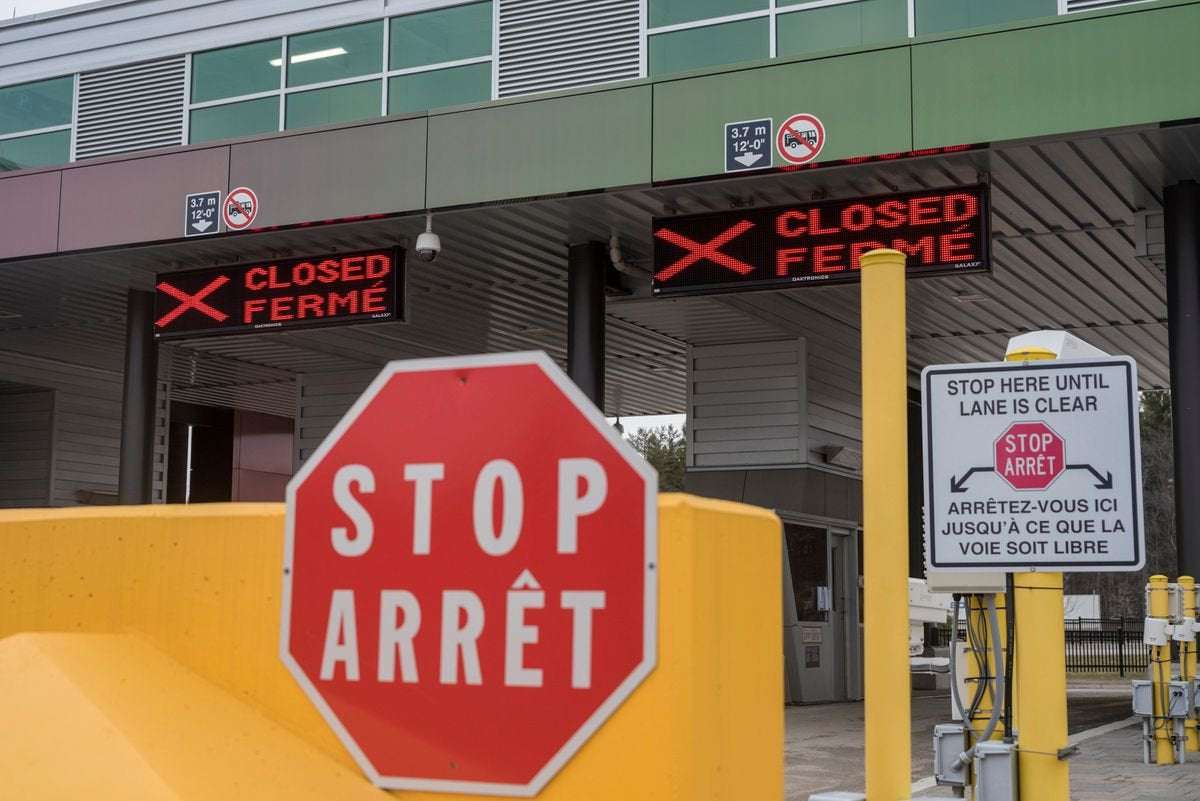Open this photo in gallery Two closed Canadian border checkpoints are seen closed to 'non-essential traffic' to combat the spread of COVID-19, at the U.S.-Canada border crossing at the Thousand Islands Bridge in Lansdowne, Ont., on March 19, 2020. Alex Filipe/Reuters
The Canada-U.S. border will remain temporarily closed to non-essential travel until at least Aug. 21 amid Canadians’ concerns about surging COVID-19 cases in the United States, according to sources.
Despite mounting pressure from some U.S. politicians in northern states and border communities to reopen the border, Prime Minister Justin Trudeau made clear Monday that he has serious concerns about a major spike in coronavirus infections in most of the American states.
“We recognize that the situation continues to be complex in the United States with regard to COVID-19. Every month we have been able to extend the border closures to all but essential goods services, and those discussions are ongoing with the United States right now as we are a week from the next deadline for closure,” he told reporters. “We are going to continue to keep Canadians safe and to keep our economy flowing.”
In a phone call on Monday, the Prime Minister and President Donald Trump discussed the border and U.S. threats to reimpose a 10-per-cent tariff on Canadian aluminum exports and the plight of imprisoned Canadians Michael Kovrig and Michael Spavor in China.
Mr. Trudeau said an announcement to continue to limit non-essential travel across the border is expected later this week. Sources have told The Globe and Mail that the ban will remain in effect until Aug. 21. The Globe granted confidentiality to the sources, who were not allowed to speak publicly about the bilateral border talks.
The 30-day restrictions were imposed in March in an attempt to control the COVID-19 pandemic and extended three times. The ban prohibits discretionary travel, such a shopping trips and vacations, but trade shipments by rail and truck continue. Essential workers and temporary foreign workers are also allowed to cross the border.
Some provinces have been strongly opposed to opening the U.S. border any time soon.
Poll finds 81% of Canadians say the Canada-U.S. border should remain closed
Ontario Premier Doug Ford said Monday that he is not in favour of opening the border for regular travel, pointing to the huge jump in infections in Florida.
“I see these numbers from Florida and they’re staggering, 15,000 people that contacted COVID in a day. That is scary, but we’re being pretty vigilant, we’re not rushing into anything,” he told reporters.
Over the weekend, more than 100,000 new coronavirus cases were recorded in the United States and seven states set daily case records. The U.S. outbreak that was once centred in New York and New Jersey is now growing across 39 states. On Monday, California Governor Gavin Newsom announced a sweeping rollback of the state’s reopening plans, closing indoor operations of restaurants, bars, zoos and movie theatres.
In Monday’s phone call with Mr. Trump, the Prime Minister also pressed him to reconsider U.S. threats to impose tariffs on Canadian aluminum.
Mr. Trudeau said he told Mr. Trump that new aluminum duties would mar the beginning of the new North American free-trade agreement, now known as the U.S.-Mexico-Canada Agreement. He added the COVID-19 pandemic had disrupted the usual supply chain for manufacturers but that it would work itself out.
“I impressed upon him that it would be a shame to see tariffs come between our two countries at a time when we are celebrating NAFTA and at a time when we want our businesses and manufactures to get going as quickly as possible,” he said.
The Trump administration exempted Canada from its aluminum tariffs of 10 per cent in an effort to secure ratification of the USMCA.
With a report from Laura Stone in Toronto
Know what is happening in the halls of power with the day’s top political headlines and commentary as selected by Globe editors (subscribers only). Sign up today.

pareech on July 14th, 2020 at 01:47 UTC »
It's hard to decipher if the threat was regarding the border not re-opening or if it was related to some other talks. Regardless, I wouldn't put it last Trump to impose the tariffs if the border isn’t reopened when he wants it reopened.
Foodwraith on July 14th, 2020 at 01:33 UTC »
By August, Florida will be at 75,000 cases a day.
working_mommy on July 14th, 2020 at 00:44 UTC »
Did I just interpret this wrong, or did Trump threaten tariffs if we dont open our border? I mean I dont put it past him, but I really hope it's just my sleepy brain not comprehending what I read.
Also as I'm too tired to look into it, can he impose new tariffs? We have a new trade agreement, doesnt he need to adhere to this?